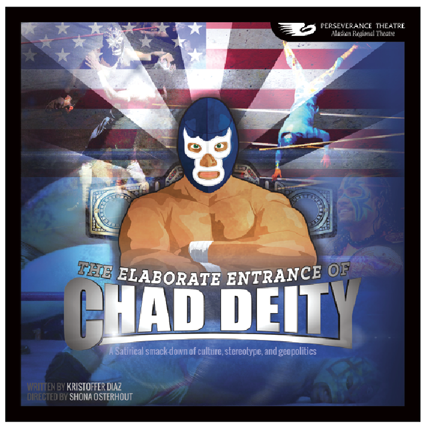|
In the United States some people cling tightly to communities defined by negative stereotypes, while others wish just as strongly for the end of this hatred. The battle between them is central to The Elaborate Entrance of Chad Deity. Written by Kristoffer Diaz and staged by Perseverance Theater, the play will be performed in Juneau from September 12 through October 7, and in Anchorage from November 9 through 19.
Nominated for the 2010 Pulitzer Prize and winner of the 2008 National Latino Playwriting Award, The Elaborate Entrance of Chad Deity transports the audience into the tumultuous universe of wrestling. The stage is the ring, and the audience are spectators to not only the wrestling match, but also the hero’s inner struggles. His name is Macedonio Guerra, Mace, a Puerto Rican raised in the Bronx who climbs into the ring just to take a dive—to let Chad Deity, the American star, win. Mace is clear on the rules: “In wrestling, you can’t kick a guy’s ass without the help of the guy whose ass you’re kicking.” In the ring, Mace plays a role that blends two stereotypes: a soldier of the Mexican Revolution, and a Latin American fighting the guerrillas. The mixture extends to the name of the character, Che Chávez Castro. Accustomed to debasing himself to become part of the sport, Mace has never imagined that he could challenge the rules of the game itself. But when a friend decides to join the wrestling world, Mace discovers that things are not so settled. The Elaborate Entrance of Chad Deity gives us a brief look at he way racial prejudice is built and maintained, and encourages minorities to take hold of the situation and change it. Enrique Bravo, the Latino actor playing Mace, says that the current political climate heightens the importance of The Elaborate Entrance of Chad Deity, since it deals with the two most threatened minorities under this administration, Latinos and Muslims. Bravo celebrates the moment in the play when the characters embodying these groups “take the situation in their own hands and come towards the forefront of this wrestling family instead of being in the shadows.” He also states that the play’s approach to racial prejudice gives voice to “many of the view points that I have as a person of color in theater.” |
